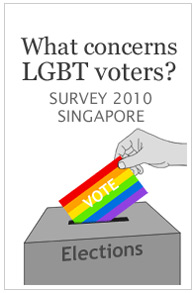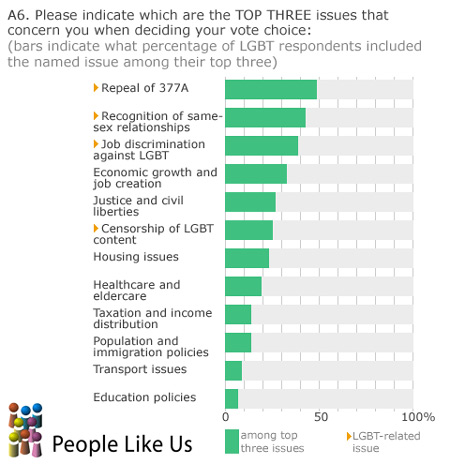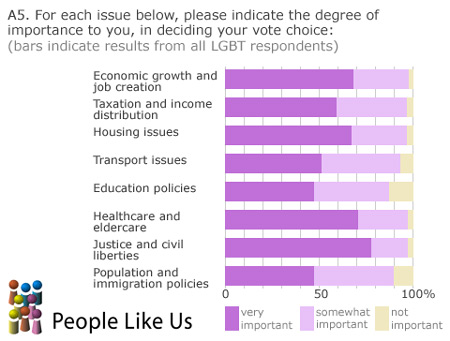The issue of Section 377A of Penal Code, which criminalises sexual relations between men, continues to dominate gay discourse in Singapore.
And it is the leading issue of concern for nearly 1 in 2 (48.5 percent) LGBT Singapore citizens, according to the results of an Internet survey released on Saturday by gay advocacy group People Like Us.

The survey is the first of its kind conducted in Singapore and ahead of the general elections widely expected in the first half of 2011.
Survey methodology
The poll, which counted 1003 valid responses, was conducted over the Internet from 7 September to 12 October 2010 and advertised on gay portals including Fridae.com. Of a total of 1156 responses, 143 responses were excluded because they did not come from Singapore citizens while another 10 were excluded as they said they were heterosexual.
Survey respondents were asked to select what they felt are their top three issues from among 12 – of which four were LGBT-related and eight non-LGBT-related. For that specific question, an additional 41 respondents, who marked more than three issues, were disqualified.
Repeal of Section 377A
While one might be surprised to see that slightly more than half did not consider Section 377A to be one of the top issues, People Like Us spokesperson Alex Au says it considers it to be a “high” percentage for a law that is largely not enforced for sex acts in private (even though technically, it applies) and compared to “possibly more pressing issues like jobs or housing affordability.”
He told Fridae in an email: “If we look at the two "dignity" issues together – repeal of 377A and discriminatory censorship – 59.4 percent of 962 LGBT responses listed at least one of these two among their top three. This is despite the fact that the law is in practice not used against private consensual relationships, nor does it apply to lesbians, and when censorship can be circumvented through the Internet. That is to say, the impact is not immediate on their daily lives. Yet nearly 60 percent are thinking beyond their immediate personal lives and can see how important these issues are in the construction of a systemic bias against them.”
Last month, a human rights lawyer M Ravi acting on behalf of this client filed an application in the High Court to challenge the legality of Section 377A. Despite the government’s promise not to proactively enforce the law following a widely publicised albeit unsuccessful campaign to have the law repealed in 2007, at least three men were charged with Section 377A in two separate cases in September. According to media reports, Home Affairs Minister Wong Kan Seng said in a parliamentary reply in 2007 that 185 men were convicted under Section 377A between 1997-2006.
Legal recognition of same-sex relationships and job discrimination
In the second position was legal recognition of same-sex relationships with 42.2 percent naming this as among their top three concerns.
Singapore does not recognise any form of same-sex partnerships.
In third place was job discrimination against LGBT persons with 38.5 percent.
Au (PLU spokesperson) told Fridae they didn’t expect the issue of job discrimination to be among the top issues of concern to gay men and lesbians although the organisation is aware that male-to-female transgenders consider it their number one issue.
“The survey shows that in fact it is a grievance that is very significant for all LGBTs. Gay men and lesbians may not be voicing it as often as transgenders but it seems they suffer from it and are therefore sensitive to it, all the time. It's a silent cancer that makes real, on a livelihood question and on a very personal level, the inequality LGBTs face every day of their lives.”
Au says the issue is linked to and reinforced by a state policy of keeping Section 377A and heavy censorship of positive gay role models in the media which reinforces prejudice.
“State policy legitimises private sector discrimination. Employers think: if the state does it, then it must be the right thing to do.”
While a number of multi-national companies have implemented non-discrimination policies on the basis of sexual orientation among other characteristics in their Singapore operations, Singapore does not have any laws against workplace discrimination on any basis of sexual orientation, gender expression, race, gender, or any other characteristics.
Ranking of 4 LGBT-related and 8 non-LGBT-related issues 
Media censorship
Censorship of LGBT themes and characters in the media – the fourth LGBT-related issue presented – was only considered by one in four respondents (25.4 percent) to be among their top three issues.
TV programmes that “advocate” or “promote” homosexuality are routinely censored. During the 2009 Oscar awards broadcast, speeches by winners Dustin Lance Black and Sean Penn who spoke about discrimination against gays and lesbians were snipped. In 2008, MediaCorp was fined S$15,000 (US$10,800) by the Media Development Authority (MDA) for broadcasting an episode of a home and decor reality TV show that featured a same-sex couple and their adopted child. On the same day of MDA’s announcement, a 3-minute segment of the Ellen DeGeneres Show during which the host condemned homophobia and spoke about a fatal shooting of a 15-year-old gay student in school, was censored on MediaCorp's Channel 5.
How important are the 8 non-LGBT-related issues
Economic growth and job creation, and justice and civil liberties
The two highest ranked non-LGBT related issues are economic growth and job creation (32.2 percent) and justice and civil liberties (26.8 percent).
Justice and civil liberties is thought to be the most important among the eight non-gay-related issues for consideration with 77.6 percent of respondents considering it very important closely followed by healthcare and eldercare (70.5 percent), and economic growth and job creation (68.5 percent), and housing issues (67.2 percent).
The report noted: “They seem to feel strongest about issues of justice and civil rights. What is not clear (because the survey design did not anticipate that this would show up so strongly) is whether (a) this arises from a dissatisfaction with authoritarianism and curtailment of civil rights generally, not distinct from that felt by many heterosexual citizens, or whether (b) this opinion is heightened by the particular grievances they have as bi- and homosexual citizens, with their gender and sexual expression regularly in conflict with state and social controls.”
Estimate of LGBT electorate size
According to the Elections Department website, there are altogether some 2.3 million electors on the current electoral registers. LGBTs are estimated to account for three to five percent of the electorate which would number between 70,000 to 115,000. Currently, the electorate size of the nine Single Member Constituencies range from 17, 170 to 35,789 and the 14 Group Representation Constituencies range from 96, 723 to 200,985.
A closer look at repeal of Section 377A of the Penal Code, censorship of LGBT themes and characters in media, job discrimination against LGBT persons, and the lack of legal recognition for same-sex relationships.
For each of the four gay-related issues (above) presented, respondents were asked if each issue was “very important”, “somewhat important” or “not important” to them in deciding which party to vote for.
From the report published by People Like Us:
Over 90 percent of respondents felt that a political party’s position on the repeal of the law was “very” or “somewhat” important to them. The males felt more strongly about this than females, with 63 percent of the former saying “very” and 45 percent of the latter saying likewise. This is not surprising as the law targets males, though it has spillover effects e.g. reinforcing stigma and discrimination against lesbians.
Male and female opinion about censorship were nearly identical. About 60 percent said a party’s position on this was “very important” in deciding their vote; about 35 percent it would be “somewhat important”.
Respondents felt most strongly over the issue of job discrimination. 84 percent of males and 90 percent of females said a party’s position on this was “very important” in their decision. Less than 2 percent of respondents felt this was “not important”.
The gender divide showed up again on the question of legal recognition of same-sex relationships. 74 percent of females, but only 57 percent of males felt it was “very important” for deciding which party to support. This correlates with the higher percentage of women in relationships.
To read the full report, click onto Survey results: What concerns LGBT voters?











 Printable Version
Printable Version












Reader's Comments
its like they polled everyone inside a old man's gay sauna or something?
90% of people care about a political party's position on an issue? are you sure you have the right country? yikes, who are these people cause my friends don't think like that
another out of touch survey with skewed results, gosh i learn more just having brunch with twelve thought leaders who actually have accomplished something with their lives and successful at what they do
i really like the its gets better campaign, smart stuff again being developed by smarter, cooler gay people with a grudge or chip on their shoulder
have a fund raiser to get a third party market research company like
McKinsey/ JP Powers or someone with some credibility to get the real opinions of the gay community, or just ask me and my cool friends what's the latest since most people follow us around and we are the new gay trend setters and thought leaders
it gets better
http://www.usatoday.com/yourlife/parenting-family/teen-ya/2010-10-19-itgetsbetter19_ST_N.htm
this does give someone an opportunity to do a real survey and set up a quality market research company like www.witecombs.com to find out what is really going on with gays and lesbians and questioning and borderline metrosexuals and actually find out ways to reach this group beyond internet sex sites when most hot guys now use facebook and now in the mainstream
actually my friends now make fun of me for being on Fridae vs Facebook like its not cool anymore
i think someone should set up the gay equivalent of www.beautifulpeople.com where the prescreen the people so they are actually good looking
by the way, my hot new gay and straight polo team is assembled and ready to go
But I did take part in the survey, which was sent to me via e-mail. Perhaps some people thought it was spam mail or could be used against them and did not respond.
Perhaps the organisation could publicise the survey more?
But lets face it Singaporeans have a bigtime reputation for apathy and not thinking for themselves so what makes this poll worrying is It shows that only half of gay voters still don't give a shit how they are treated by the authorities and are totally cowed...but 10 years ago more like 99% would be totally cowed and too scared to even answer the questionnaire...
This is so bad news for me and my friends ...it makes it harder to bash and ban gays...they get all righteous just cos we want to treat them like criminals and bogie men...Its a worrying trend...
Until you cease to be bounded and affected by social law, you can repeal the shit out of all the judicial law all you want, and it still wont make a difference.
As far as I can tell, we(the) just want a "legit excuse" for sucking cock.
It's really funny how much time he spends reading the articles here and commenting on them if he finds it so uncool. He must be one of the most regular and loyal contributors here!
Or maybe he thinks it's a good forum to promote himself. Read every comment he makes, he never fails to turn it into a lame self-promoting post.
Besides its usual messy menstruation here, it has no life nor purpose. It has MANY MANY other multiple fake profiles too here that I've time and again exposed but unfortunately no action taken by Fridae.
So now I seldom bother commenting in Fridae whose credibility for a real forum is questionable with these multiple deliberate trolls.
The messy menstruation has spawned many imitations, like Kumabro_oz- the other fake rejected phantom understudy in Orphanage the movie.
:)
because of such issue that other think that our same sex r/s is not normal this causes alot of problem for couples and family member. The sad thing is end of the day ur r/s broken up because u r not 'normal', because we are in the same sex r/s.
Repealing or amending 377a certainly conveys a stronger message that in the government's view, consensual homosexual activities between adult gays done privately, in themselves, aren't wrong---and hence doesn't deserve to be stigmatised.
S377a is also an obstacle to many other issues affecting the lives of LGBT in Singapore. With S377a, it become illegal to promote the healthier models of homosexual lifestyle because any homosexual lifestyle is illegal. 377a makes it difficult for governmental agencies to work directly with LGBT organisations, to sponsor the latter's campaigns, to endorse the healthier alternatives for gays to live as gays here without harming the rest in the society. 377a makes it impossible for school sexuality education curriculum to offer any advice on having safer gay sex, because even protected gay sex is illegal according to 377a, whether it's consensual or not, & whether it involves children. Can any governmental agency endorse and sponsor any activity that promotes illegal activities? No. So, in order for the governmental agencies to support and sponsor those campaigns, it's crucial that 377a be repealed or amended.
My personal take is it's better to petition for amendment rather than total repeal, because it's less likely to meet with as much opposition from the anti-gay extremists and conservative majority. How could we amend 377a? By adding a few conditions perhaps, such as:
377a should apply ONLY if the gay sex involves:
1) rape;
2) children;
3) people of unsound mind.
[Quote]
How could we amend 377a? By adding a few conditions perhaps, such as...377a should apply ONLY if the gay sex involves:
1) rape;
2) children;
3) people of unsound mind.
[Endquote]
Singapore already has laws covering those situations. There can be no compromise when it comes to S 377a.
Please log in to use this feature.